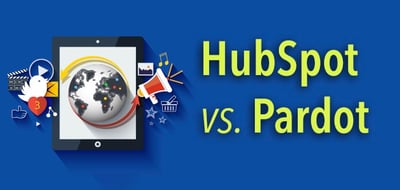When you need an inbound marketing solution for you business it can be tough to narrow down all of the great choices. In this post we will look at both HubSpot and SalesForce’s Pardot and compare and contrast them to help you select the best option for your business.
HubSpot vs. Pardot is an interesting battle. They are both integrated, automated inbound marketing platforms with tools designed to make your life easier with faster speeds, better leads, social media managements, and metrics that matter. Inspired by G2Crowd’s recent comparison of the two, here’s our rundown on both.
Size and More Matters
Although there are solutions for businesses of all sizes, HubSpot is better targeted to smaller companies (those with 50 employees or less), while Pardot seems a better match for mid-size businesses, boasting more than 50 but less than 1,000 employees. The reviews are evenly matched when it comes to enterprise-size businesses of more than 1,000 employees. It makes sense that smaller businesses would prefer HubSpot since their pricing structure is significantly lower than Pardot—HubSpot starts at $200 per month; Pardot’s lowest rate is $1,000 per month.
Beyond size, G2Crowd’s reviewers were primarily from marketing and advertising, computer software, and IT companies. Marketers preferred HubSpot over Pardot, which was the preference of computer software pros. Overall, these two marketing solutions were ranked the highest out of all the choices.
Background Development
HubSpot was initially created as a marketing-solution tool, but has continued to expand to an all-in-one platform, now handling content management and marketing automation. Its strength lies in its ability to manage all of your online needs—website hosting, social media posting, and marketing tracking—through a wide range of flexible features.
On the other hand, Pardot is primarily focused on marketing automation, and since its acquisition by SalesForce, has become an essential part of that platform. Unlike HubSpot, it is not striving to be an all-in-one solution; however, it does make a great automation add-on to an existing CRM system.
Pros and Cons
Part of the “which is better for me” decision will be based specifically on you and your unique business needs, not just your industry. HubSpot appeals to people who like modern and user-friendly platforms; the company is constantly making updates and improvements to their program. They excel at making social media in an easy and accessible manner, thus highlighting its central role in current marketing strategies. The lead-scoring tools make it easy for users to see what is working and what is not. Highlights include: content generation tools, social media integration, lead scoring, workflows, and list managements.
On the other hand, Pardot is clean and straight-forward, allowing users to easily access what they want when they want it. Not to say that they do not make improvements, but they are not necessarily striving to be hip and sleek. The well-structured system makes it easy for users to customize fields and remain organized while integrating it with a CRM. According to CRM Switch, these functions allow it to stand out from competitors, particularly when it comes to automation. Highlights include: clean organizational structure, custom fields and syncing, tracking functions and custom redirects, and prospect activity breakdown.
Overall, both HubSpot and Pardot have a lot of great features and functions. One is not necessarily better than the other in general, but one may meet and solve your specific business and marketing needs more than the other can. Use this post as a guide and do some additional research before committing to ensure the best possible match.
If you're interested in learning which platform will work better for your business, don't hesitate to contact us by clicking below!
